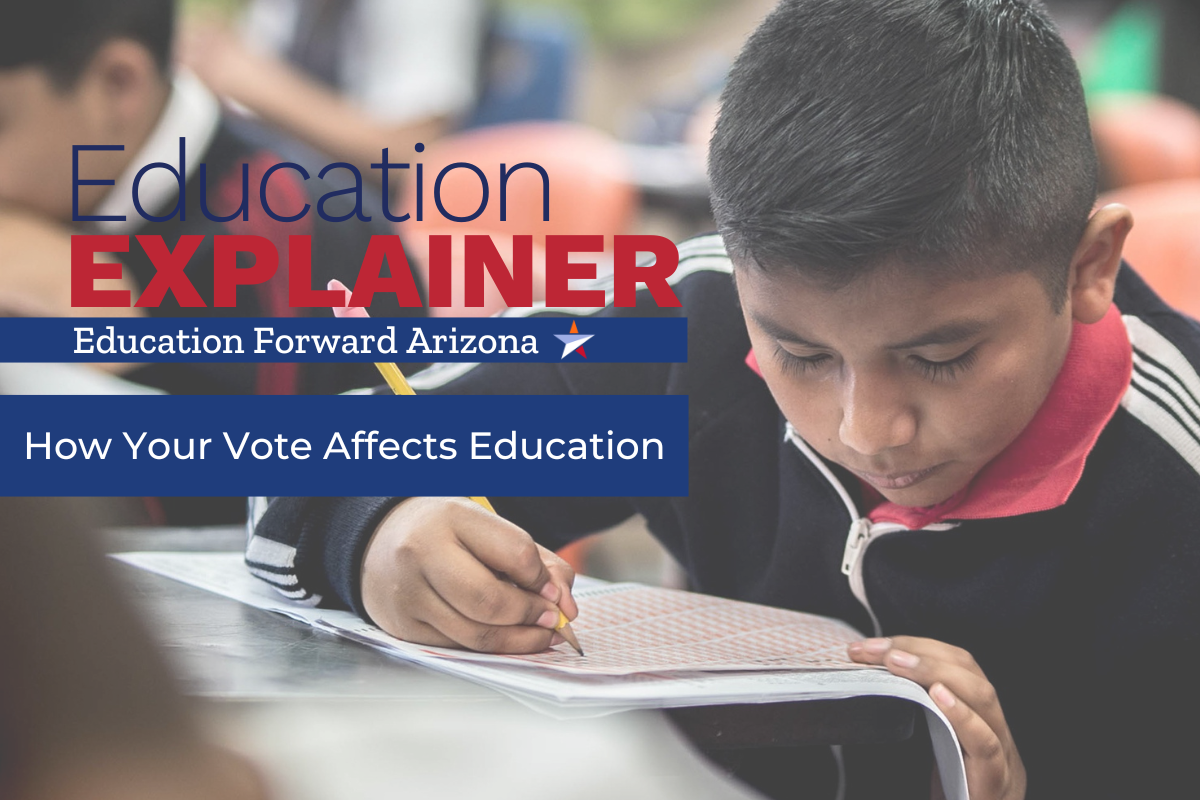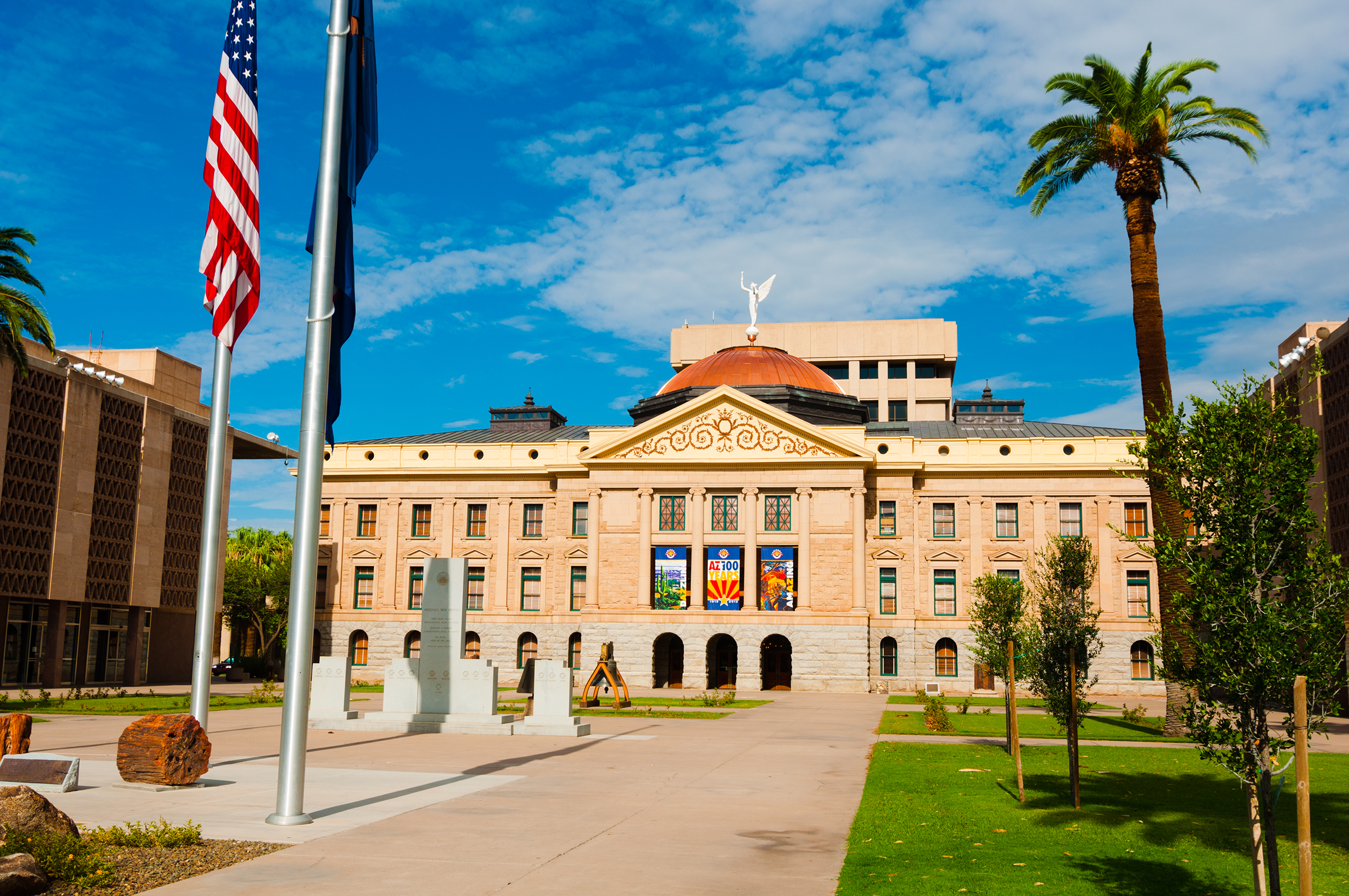
Education Explainer – Understanding the Ballot Measures That Affect Education in Arizona
Education Forward Arizona is committed to ensuring that public education remains a focal point across all levels in the state of Arizona. As a nonpartisan organization, we strive to be a trusted advocate for issues related to education leading to the Achieve60AZ goal. We provide insights, data, and research that many use to make informed decisions. We believe that in order to move Arizona forward, we must move education forward.
Arizona voters have spoken in the local primary races and now we gear up for a General Election this November. We are happy to provide an overview of the different races and ballot initiatives that will affect public education and our future in Arizona.
How Candidates Impact Education
Education Forward Arizona recently held a Power Hour advocacy webinar on August 1, “How candidates impact education”. In this Power Hour, we hosted three experienced panelists who provided insight and personal anecdotes in what to look for in elected officials, whether the candidate is running for a local school board, county superintendent of public schools, or a legislative seat.

Former State Representative Joel John offered this advice for electing legislators:
Legislators create laws that impact schools. Follow the candidate’s social media, particularly their X (formerly Twitter) account, and review their website. Look to see if the candidate is a supporter of public education or prefers to engage in partisan charged and divisive issues
Yavapai County Superintendent of Public Schools Tim Carter, who is retiring at the end of 2024, offered this advice and explanation of the role of a County Superintendent:
The Office of the County Superintendent is a service agency and believes the role is to provide services to all the schools in the county. The County Superintendent also serves as the Fiscal Agent for all the schools in the county by overseeing, without directing, financial resources. The County Superintendent also manages all school elections in the county including members of school boards while also making interim appointments when needed.
Julie Bacon, Leadership Development Specialists, Arizona School Board Association, offered this advice about the role of school boards and members:
School Boards create policies and set the tone and culture for the district. School Boards should have a “student first” philosophy while providing oversight, not day-to-day operations, for the district. Serving as a school board member is a volunteer job that requires 2 to 20 hours per week.
Julie offered these questions to ask when considering school board candidates:
- What will be your priorities if elected?
- How familiar are you with the district?
- Do you know the laws and policies around Arizona public education?
- What are your thoughts about […]
Understanding the Ballot

State Legislative Races:
There are 30 Legislative Districts in Arizona, the voters in each District elect one Senator and two Representatives. This November, nine Legislative Districts (LD 3, 6, 18, 20, 21, 24, 25, 27, and 28) have a candidate from a single party running for State Senator, the remaining districts will have both Republican and Democrats on the ballot. Similarly, for the House of Representatives, four of the Legislative Districts (LD 5, 14, 20, and 24) have a single party running for the two legislative seats, the other 26 LDs will have full slates running for the two seats.
County Superintendents:
Arizona has 15 counties, and each county picks someone to oversee its public schools. This person is usually called the County Superintendent of Schools.
In November, most counties will only have one person running for this job, but three counties – Maricopa, Navajo, and Yuma – will have both a Republican and a Democrat on the ballot.
School Board Elections:
Your local school board makes important decisions that affect students, teachers, and school staff. It’s crucial to know who’s running for these non-partisan positions; the candidates will not be identified as Democratic or Republican.
Make sure to research the candidates in your area. Look for candidates who care about students and understand how schools work. It can be helpful to be familiar with education laws and what it takes to run a successful school district. Following the advice of Julie Bacon, you want to make sure that School Board members have a “student first” philosophy.
Bonds and Overrides:
Many Arizona school districts are asking voters to approve special funding called bonds and overrides.
- Bonds are used to build or improve school buildings, buy buses, and upgrade facilities.
- Overrides help schools pay for things like teacher salaries, after-school programs, and school safety.
Because state funding is often inadequate, these funds have become essential to schools to support modern classrooms, safe campuses, and qualified teachers. By supporting bonds and overrides, you’re investing in your community’s future and preparing our students for the bright future they deserve.
Propositions

Proposition 314
In keeping with our focus on public education advocacy, we have taken a position on Proposition 314, formerly known as HCR 2060 and strongly urge Arizona voters to vote “no” on this proposition.
Proposition 314 would increase immigration enforcement and threatens Arizona’s education goals and our economic future. Arizona faces a crisis of chronic absenteeism, with rates soaring during the pandemic and continuing to worsen. Introducing measures that could enforce immigration laws in schools will only increase fear among students and families, potentially keeping them from attending school out of concern for encountering authorities.
Education Forward Arizona believes in fostering an inclusive and supportive educational environment that prepares our youth for future success. Proposition 314 contradicts these values, jeopardizing our efforts to improve educational outcomes and build a skilled workforce.
Proposition 402 – The Arizona Expenditure Limit and Eastern Arizona College in Graham County
Proposition 486 – The Arizona Expenditure Limit and Maricopa County Community College District in Maricopa County
Note: This topic will be fully explained in an upcoming Education Explainer
Community Colleges are primarily funded through property taxes, tuition, and varying amounts of state funding. Despite having collected the various funding amounts, community colleges are limited in how much can be spent; this is known as the Expenditure Limit. Proposition 402 in Graham County and Proposition 486 in Maricopa County is an opportunity to increase the Expenditure Limit, allowing Eastern Arizona College and the Maricopa County Community College District to fully access the resources that have already been collected, without raising taxes.
Arizona community colleges are facing financial restrictions due to an outdated spending limit set in 1979. This limit prevents colleges from keeping up with modern educational needs and can result in penalties if exceeded.
The mathematical formula that determines the amount of expenditures a college is legally allowed to make, regardless of the amount of resources a college has collected, is based on three components:
Expenditure Limit = Base Amount x FTSE (Full Time Student Equivalency) x Inflation Factor
Arizona voters in Graham County and Maricopa County will be asked to change the formula by updating the Base Amount to reflect today’s reality versus an amount set in 1979. It is important to note that this is simply an adjustment to a mathematical formula and does not raise property taxes in the two counties.
Recent Education Forward Arizona Poll Data
Arizona voters have spoken loud and clear: education is a top priority. A staggering 96% of voters believe every child deserves a quality education, no matter their zip code. This isn’t just a belief; it’s a demand for our leaders.
We know that to thrive in today’s economy, Arizonans need more than a high school diploma. Whether it’s an industry-recognized workforce certificate, a community college degree, or a four-year university, continued education beyond high school is essential for success.
It’s time to invest in our future. We encourage you to support candidates and initiatives that prioritize education at every level. Your vote is your voice. Let’s make it heard.
Vote for education.
